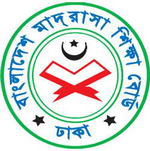Bangladesh Madrasah Education Board
| বাংলাদেশ মাদ্রাসা শিক্ষা বোর্ড Alia Madrasah Education Board | |
 Seal of Bangladesh Madrasah Education Board | |
| Board overview | |
|---|---|
| Formed | 1979 |
| Jurisdiction | Government of Bangladesh |
| Headquarters | 2 Orphanage Road, Baksibazar, Dhaka |
| Board executives | |
| Parent department | Ministry of Education |
| Website | bmeb |
| Islam in Bangladesh |
|---|
 |
Bangladesh Madrasah Education Board (Bengali: বাংলাদেশ মাদ্রাসা শিক্ষা বোর্ড) or Alia Madrasah Education Board started its activity independently in 1979.[1][2] With the passage of time in Bangladeshi madrasah education several amendments have come to pass. In 1978 humanities and science faculties were included at the Alim (عالِم) level. In 1980 Fazil (فاضل) degrees were granted the same standard of education as Higher Secondary School Certificate (HSC) degrees but this was changed in later years with Dakhil (داخل) level having the equivalency of Secondary School Certificate (SSC) since 1985, and Alim being considered as the HSC equivalent since 1987.[3][4][self-published source?][5]
Humanities, science, business and technical education has been included with madrasah education. Meanwhile, a law has been passed for Fazil and Kamil (کامل) levels to be considered equivalent with bachelor's and master's degrees in general education.
Background
[edit]Alia Madrasah was established in Calcutta in 1780 by the East India Company through Headteacher Majduddin and this later formed the Madrasah Education Board of Bengal. Madrasah education was then started formally. Late A. K. Fazlul Huq the prime minister declared in a prize giving ceremony is Kolkata Alia Madrasah in 1939, "I want the spread of Madrasah Education should be modernized and an Islamic Arabic University should be established".[citation needed]
To materialize this declaration of sher-E-Bangla a committee named Moula Box was formed. This committee advises on the development of madrasah education. In 1947 after the independence of Pakistan many commissions were formed for the development of madrasah education. Among them in 1949 the "West Bengal Educational System Reconstruction Committee" was formed and in 1963-64 the name of Arabic University was mentioned.[citation needed]
In 1971, after the independence of Bangladesh, steps were taken for the modernization of madrasah education. Bengali, mathematics, English, social science, general science were made compulsory. In 1978 the Madrasah Education Board was formed under Ordinance for the Modernization of Madrasah Education. The board has faced difficulties in recruiting teachers for science related classes.[6] In 2017 Bangladesh government removed references to Jihad from books of Madrasah Education Board.[7]
See also
[edit]- Qawmi
- Education in Bangladesh
- Al-Haiatul Ulya Lil-Jamiatil Qawmia Bangladesh
- Bangladesh Qawmi Madrasah Education Board
- Islam in Bangladesh
- Religious education
- Charity school
- List of Islamic seminaries
References
[edit]- ^ "Education Board Bangladesh". www.educationboard.gov.bd. Retrieved 28 December 2020.
- ^ "Historical Study of Madrasah Education in Bangladesh - Assignment Point". Retrieved 28 December 2020.
- ^ Islam, Mohammad Saiful (2012). "Modernization of Madrasah Education in Bangladesh: A New Approach for Future Development".
- ^ "Madrasah Education System in Bangladesh". 23 April 2018.
- ^ "You are being redirected..." www.islamic-relief.org. Retrieved 28 December 2020.
- ^ "Alia Madrasa: an education system on its death bed". The Daily Star. 27 October 2017. Retrieved 18 December 2017.
- ^ "Bangladesh to remove Jihad from madrasa textbooks". Dhaka Tribune. Retrieved 18 December 2017.
